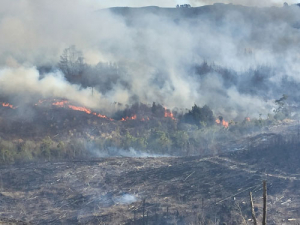On Your Behalf: Health and Safety Checklist for Vineyards and Wineries
Keeping healthy and safe during vintage 2026
 A recent burn-off at Tinopai Peninsula in Northland, which got out of control, cost between $20,000 to $50,0000 to get under control.
A recent burn-off at Tinopai Peninsula in Northland, which got out of control, cost between $20,000 to $50,0000 to get under control.
The response to a Northland burn-off that got out of control cost $20,000 to $50,000, involving two helicopters and volunteers from four local areas.
John Rasmussen, national manager rural operations, Fire and Emergency NZ, says there was also damage to a neighbouring property and work downtime for the volunteer firefighters.
Farmers are now being urged to seek advice from rural fire officers before burning off standing vegetation or slash. Four rural people have died in the last 10 years in burn-offs that got out of control.
The Northland landowner was intending to burn off about 2ha of standing gorse and logging waste on the Tinopai Peninsula, Kaipara Harbour. But the fire jumped a firebreak into more gorse and slash, eventually burning through most of a 50ha block before stopping when it got to green pasture.
Fire and Emergency NZ Northland deputy-principal rural fire officer Rory Renwick says after jumping the firebreak the fire burnt rapidly along a ridge to where a digger was still building more fire breaks.
“Fortunately the operator had not pushed far into the block and was able to get to a clearing just before the 6-8m flames crossed the narrow fire break he was working on,” says Renwick.
Fire crews initially focused on protecting a nearby dwelling and a block of totara, then moved on to protect a small plantation of blackwoods. Two helicopters were used to try to prevent the fire from crossing a waterway through the middle of the 50ha block. Renwick says even though there is open fire season and permits are not required, they urge anyone considering a burn-off to get in touch first.
Rasmussen told Rural News 30% of the fire service’s responses to wildfires are related to burning off waste.
“Some of them cost a lot of money and some burn considerable areas. Some cause injuries and even fatalities,” he told Rural News.
“We have had four fatalities in the last 10 years where farmers or rural people were undertaking controlled burns like clearing gullies or scrub or burning an area of vegetation. They don’t understand fire behaviour, fire potential, the spread rate or how it increases intensity going uphill.
“They get themselves in the wrong position or the people who are working with them on the burn do, and they end up with a disaster.
“You should seek advice even if it is an open fire season if you are doing a controlled or prescribed burn; get professional advice.”
The Northland fire would have cost $20,000 to $50,000 fire for the response.
“Fires go far greater than $20,000 to $50,000 so it is an expensive business,” Rasmussen says.
Be careful
If Fire and Emergency NZ is carrying out a burn in any area of vegetation, they put together controlled burn plan, says Rasmussen
“You map it out, you determine where your fire breaks will be and what weather pattern you will light that fire on and what is the forecast weather, the pattern of burn light up and where you will put your fire suppression resources etc.
He says expertise of a rural fire officer might be able to add something to that.
“We are not opposed to the safe use of fire. We are there to support rural people in terms of undertaking burning as part of their land management activity. We think that is a sensible thing to do. But we want them to do it safely and we are there to support them in that process.”
To check the fire season status of your region and, if necessary, apply for a fire permit, go to www.checkitsalright.nz.
The Meat Industry Association of New Zealand (MIA) today announced that Chief Executive Officer Sirma Karapeeva has resigned from the role.
The winners of the 2026 Hawke’s Bay/Wairarapa Dairy Industry Awards were announced at the annual awards dinner held at Copthorne Solway Park in Masterton on Thursday evening.
Environment Southland is welcoming this week’s decision by the Environmental Protection Authority (EPA) to approve the release of Blaptea elguetai, a leaf‑feeding beetle that will help control the highly invasive Chilean flame creeper.
This March, the potato industry is proudly celebrating International Women’s Day on 8 March alongside the International Year of the Woman Farmer, recognising the vital role women play across every part of the sector — from paddocks and packhouses to research, leadership, and innovation.
Fruit trader Seeka posted a record profit and returns to shareholders in 2025.
Recent weather events in the Bay of Plenty, Gisborne/Tairawhiti, and Canterbury have been declared a medium-scale adverse event.

OPINION: A mate of yours truly reckons rural Manawatu families are the latest to suffer under what he calls the…
OPINION: If old Winston Peters thinks building trade relations with new nations, such as India, isn't a necessary investment in…